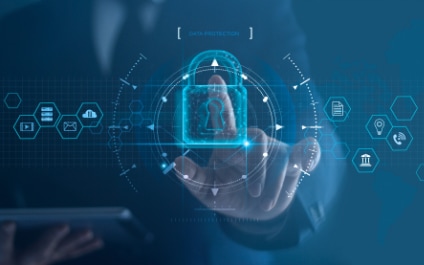Reminiscing on the history of cybersecurity might sound a little strange. The history of cybersecurity isn’t as deeply rooted as the history of say, other types of security—like the Wells Fargo stagecoaches in the Wild, Wild West, or the evolution of armored cars used by banks to transport large sums of money.
The aspects of physical security have been around for much, much longer than cybersecurity, but that doesn’t make them any less important. In fact, with the consistently evolving dependence we place as a society and economy on IT, it’s likely that cybersecurity is quickly becoming an even more important facet of overall company security.
Just like with physical security, cyberattacks from the “bad guys” will consistently evolve. As technology changes, criminals—and their malicious methodologies—change, too. If we can take any lesson from history, it’s that when a company doesn’t evolve, criminals will find new ways to breach security clearances and protections.
If you’re reading this and thinking, “but I’m just a small business—cybercriminals don’t care about me,” we advise you to think again. —research shows that small businesses are consistently dealing with a higher percentage of vulnerability to cyberattacks.
So, what can we—as small businesses—learn from the history of cybersecurity and attacks, and further, how can we take those lessons and apply them to more thorough, more secure methods of cybersecurity?
Continue reading to learn more about the history of cybersecurity and what lessons we can glean from the past.
Understanding the Past to Protect Our Future
Like all types of crime, cybercrime is reinvented consistently through near-constant new iterations of itself.
Remember those stagecoaches we mentioned earlier? In the Wild, Wild West, companies like Wells Fargo would send unprotected stagecoaches full of money straight out to California. At first, this wasn’t problematic. But of course, as the “bad guys” learned the plan, stagecoaches were robbed. Wells Fargo adapted—they sent their money on trains. Of course, bad guys learned of this, too—they started robbing trains. This consistent lesson reinvented itself time and again until Wells Fargo understood their security plan should constantly evolve.
Cybersecurity is no different.
All that to say, cybercrime isn’t a new phenomenon.
It’s something that’s been prevalent since the 1950s and something that continues to evolve. The danger is real, the form of attack is constantly changing, and the malicious intent of cybercriminals can put any site, server, network, and more at risk.
It’s important to understand that there will never be an end to cybercrime—all we can do is continue to evolve with it, ensuring we’re always one step ahead.
The Federal Government recognizes the importance of this, which is why regulators are beginning to crack down on cybersecurity. You can expect together regulations, stricter policies, and updated standards for everyone—ranging from the US to congress and beyond.
Must-Know Steps for Cybercrime Prevention
Part of ensuring we’re protecting ourselves from cybercrimes and attacks is to ensure that the plan to improve your own cybersecurity is never-ending.
On its own, that sounds intimidating, but through a few simple, beginner-friendly steps, you can kickstart your cybercrime prevention strategy.
Consider evaluating your business and creating a checklist that hits on important points like:
-
Consider working with a professional service to evaluate your current system, provide an audit with actionable changes, and suggest a continually updated plan for protecting your company.
-
Always keep your systems up to date—install patches and updates as often as needed.
-
Don’t forget to backup your system—have multiple backups, on-site with frequent backups, and off-site mode with long retentions (and test these backups, too!).
-
Don’t settle for a consumer firewall—you need something strong, something tested, and something professional. Using a business class firewall is crucial for your protection.
-
Subscribe to Intrusion Detection (IDS) and Intrusion Prevention (IPS) services. (This is a must).
-
Stop settling for sub-par passwords. Make sure all passwords are strong and changed regularly—this goes for your employees’ passwords, too.
-
Don’t forget to protect your emails—you can put yourself at risk through malware, viruses, spam, phishing, and identity theft if you leave your email vulnerable.
-
Multi-factor authentication is an absolute must for every system and application.
-
Don’t skimp on training. Ongoing training for you—and your entire company—is crucial for the ongoing protection of your business. If your employees aren’t informed or following rules, you put your business at a greater risk for cybercrime. As Tony Robbins & Zig Ziglar have frequently said, “Repetition is the mother of Skill!”
Most importantly, it’s crucial that you make cybersecurity a vital, functioning piece of your company’s DNA. Your company cannot exist without cybersecurity—not in a safe, manageable way in our modern era, anyway.
Don’t let the past repeat itself—learn from the Wild, Wild West, learn from the early days of cybersecurity, and learn from the failures of other companies who have refused to evolve with technology.
Leaders Take Action!
Confidence and Ego aside, you run a great business/organization but you’re a businessperson not a Cybersecurity expert. Don’t risk what you’ve invested (time, money and sleepless nights) by reading this and just letting it go as another LinkedIn article read. TAKE ACTION!
Because we give back to the community, we are giving away 2 businesses/organizations FREE Cybersecurity Assessments each day until we have to pull this offer.
To get your Assessment visit: https:/www.ybs.us/cybersecuritybook/
Why should you listen to me?
Bio
I’m a 2-Time Best Selling Author on the topic of Technology. My company (Your Business Solutions) is celebrating our 16th year in business this year. We’ve been recognized by INC Magazine TOP 5000 list and The Houston Business Journal in their Fast 100 list just to name a few things.
To get your Assessment visit: https://www.ybs.us/cybersecuritybook/

